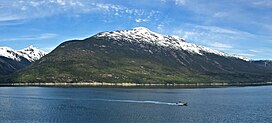| Face Mountain | |
|---|---|
 Southeast aspect of Face Mountain Southeast aspect of Face Mountain | |
| Highest point | |
| Elevation | 5,052 ft (1,540 m) |
| Prominence | 580 ft (180 m) |
| Isolation | 1.36 mi (2.19 km) |
| Coordinates | 59°28′40″N 135°25′45″W / 59.47778°N 135.42917°W / 59.47778; -135.42917 |
| Geography | |
 | |
| Interactive map of Face Mountain | |
| Location | Tongass National Forest Skagway Borough Alaska, United States |
| Parent range | Coast Mountains Boundary Ranges |
| Topo map | USGS Skagway B-2 |
| Climbing | |
| Easiest route | Scrambling |
Face Mountain is a 5,052 ft (1,540 m) mountain summit located in the Boundary Ranges of the Coast Mountains, in the U.S. state of Alaska. The peak is situated 4.2 mi (7 km) west-northwest of Skagway, and 4.3 mi (7 km) north of Mount Harding, on land managed by Tongass National Forest. Although modest in elevation, relief is significant since Face Mountain rises above tidewater of Taiya Inlet in less than 2.5 miles (4 kilometres). This geographic feature was named "Parsons Peak" in 1897 by the United States Coast and Geodetic Survey, and has had variant names "Gnome Mountain", and "The Sphinx" used locally to describe a face in the rock. The mountain's present name and summit location was officially adopted in 1985 by the U.S. Board on Geographic Names, however USGS maps still show the old name, Parsons Peak, as the summit. Precipitation runoff from the mountain drains into tributaries of Taiya Inlet.
Climate
Based on the Köppen climate classification, Face Mountain has a subarctic climate with cold, snowy winters, and cool summers. Weather systems coming off the Gulf of Alaska are forced upwards by the Coast Mountains (orographic lift), causing heavy precipitation in the form of rainfall and snowfall. Winter temperatures can drop below −20 °C with wind chill factors below −30 °C. This climate supports a glacier north of the summit. The months May through July offer the most favorable weather for viewing or climbing Face Mountain.
Gallery
See also
References
- ^ "Face Mountain". Geographic Names Information System. United States Geological Survey, United States Department of the Interior. Retrieved April 5, 2020.
- ^ "Face Mountain - 4,830' Alaska". listsofjohn.com. Retrieved April 5, 2020.
- "Face Mountain". Bivouac.com. Retrieved April 5, 2020.
- Frank Norris, The Skagway News, Aug 29, 2017
- Peel, M. C.; Finlayson, B. L.; McMahon, T. A. (2007). "Updated world map of the Köppen−Geiger climate classification". Hydrol. Earth Syst. Sci. 11. ISSN 1027-5606.
External links
- Face Mountain: weather forecast
- Face Mountain: Flickr photo
| Boundary Ranges | |
|---|---|
| Ranges | |
| Mountains | |
| Passes | |
| Icefields | |
| Parks | |
